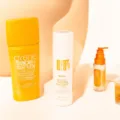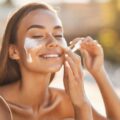Skin cancer is a serious concern, but with the right knowledge and preventive measures, we can protect ourselves and our loved ones. This article will explore important facts about skin cancer and highlight beauty products that can aid in prevention, empowering you to make informed choices for your skin health and overall wellbeing.
1. Understanding Skin Cancer: Types and Risk Factors
Skin cancer is the most common type of cancer, with millions of cases diagnosed each year. There are three main types:
- Basal cell carcinoma
- Squamous cell carcinoma
- Melanoma
While anyone can develop skin cancer, certain factors increase your risk, including fair skin, a history of sunburns, excessive sun exposure, and a family history of skin cancer. Understanding these risk factors can help you take appropriate precautions.
2. The Importance of Sun Protection in Skin Cancer Prevention
Sun protection is crucial in preventing skin cancer. UV radiation from the sun is the primary cause of skin cancer, making it essential to shield your skin from harmful rays. This doesn’t mean you have to avoid the sun entirely—it’s about finding a healthy balance and using the right protective measures.
Incorporating sun protection into your daily routine is a simple yet effective way to reduce your risk of skin cancer. This includes using sunscreen, wearing protective clothing, and seeking shade during peak sun hours.
3. Sunscreen: Your First Line of Defense
Sunscreen is one of the most important beauty products for skin cancer prevention. When choosing a sunscreen, look for these features:
- Broad-spectrum protection (against both UVA and UVB rays)
- SPF 30 or higher
- Water-resistant formula
Apply sunscreen generously to all exposed skin, including often-forgotten areas like the ears, back of the neck, and tops of the feet. Reapply every two hours or after swimming or sweating.
4. Skin-Loving Ingredients That Offer Added Protection
While sunscreen is essential, other skincare ingredients can provide additional protection and support skin health:
- Antioxidants like vitamin C and E: These help neutralize free radicals caused by UV exposure
- Niacinamide: Improves skin barrier function and may help repair UV damage
- Green tea extract: Contains polyphenols that may protect against UV-induced skin damage
- Hyaluronic acid: Helps keep skin hydrated and plump, supporting overall skin health
Look for these ingredients in your serums, moisturizers, and other skincare products to boost your skin’s defenses.
5. The Role of Clothing and Accessories in Sun Protection
Beauty isn’t just about what you put on your skin—it’s also about how you dress. Protective clothing and accessories play a vital role in preventing skin cancer:
- Wide-brimmed hats: Protect your face, ears, and neck
- Sunglasses: Shield your eyes and the delicate skin around them
- UPF clothing: Specially designed to block UV rays
- Long-sleeved shirts and long pants: Provide coverage for arms and legs
Remember, fashion and sun protection can go hand in hand. Many stylish options are available that offer both aesthetic appeal and sun safety.
6. The Importance of Regular Skin Checks and Early Detection
While prevention is key, early detection is crucial for successful treatment of skin cancer. Make self-examinations a regular part of your beauty routine:
- Check your skin monthly for any changes or new moles
- Use the ABCDE method to evaluate moles (Asymmetry, Border, Color, Diameter, Evolving)
- See a dermatologist annually for a professional skin check
Remember, taking care of your skin is an act of self-love. By being proactive about skin cancer prevention and early detection, you’re nurturing your health and wellbeing.
Frequently Asked Questions
Q1: Can I still get a tan if I’m using sunscreen?
A: While sunscreen significantly reduces UV exposure, it doesn’t block 100% of UV rays. You may still get a slight tan, but remember that any change in skin color is a sign of skin damage. For a safer glow, consider using self-tanning products.
Q2: Are natural sunscreens as effective as chemical ones?
A: Both natural (mineral) and chemical sunscreens can be effective when used correctly. Mineral sunscreens containing zinc oxide or titanium dioxide provide broad-spectrum protection and are often recommended for sensitive skin. The most important factor is choosing a sunscreen you’ll use consistently.
Q3: How often should I reapply sunscreen if I’m not swimming or sweating?
A: Even if you’re not swimming or sweating, it’s important to reapply sunscreen every 2 hours. Sun exposure gradually breaks down the protective ingredients in sunscreen, reducing its effectiveness over time.
Q4: Can I get enough vitamin D if I always wear sunscreen?
A: While sunscreen does reduce vitamin D production in the skin, most people can still maintain adequate vitamin D levels with normal sunscreen use. You can also obtain vitamin D through diet or supplements. Consult with your healthcare provider if you’re concerned about your vitamin D levels.
Q5: Are tanning beds safer than outdoor tanning?
A: No, tanning beds are not safer than outdoor tanning. In fact, they can be more dangerous as they emit concentrated UV radiation. The World Health Organization has classified tanning beds as carcinogenic to humans. For a safer alternative, consider using self-tanning products or embrace your natural skin tone.
Remember, caring for your skin is an essential part of self-care and overall health. By understanding skin cancer risks and taking preventive measures, you’re not just protecting your skin—you’re nurturing your wellbeing and setting an example for others. Stay informed, stay protected, and celebrate the beauty of healthy skin.









